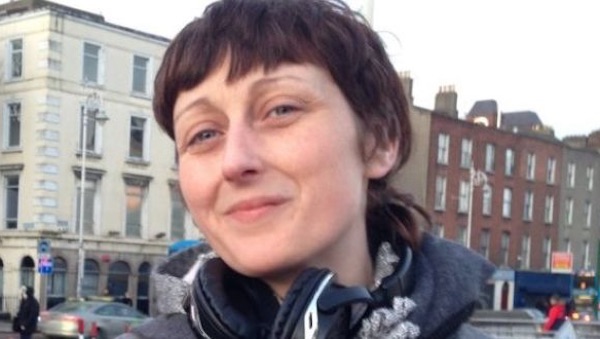
An activist journalist and blogger has become the human face of the policing crisis in the 26 Counties after she took her life following a public humiliation at the hands of the Gardai.
Dara Quigley died on 12 April, a number of days after she was arrested in Dublin under the Mental Health Act and dragged into a Garda car after she was found walking naked on a Dublin street.
CCTV footage of her arrest was allegedly uploaded by a member of the Gardai to the internet and subsequently shared on Facebook where it was viewed over 100,000 times. She took her own life a number of days later.
Ms Quigley was a prominent anti-water charge and anti-austerity activist.
An investigation by the Garda Ombudsman is looking into the conduct of the Gardai in relation to this woman before her death. It was reported that one member has already been suspended with full pay in connection with the case.
Speaking in the Dublin parliament, Sinn Fein’s Mary Lou McDonald said what happened to Ms Quigley was an example of a “culture of humiliation”.
She described the uploading of the CCTV as “really deplorable and revolting” which had brought “very great distress” to Dara and her family.
“When we talk about garda culture and reform and accountability, I suppose this is the rawest end, the sharpest end of a deplorable culture of humiliation and disregard for human beings,” she said.
At a vigil outside the Dublin parliament on Friday evening, Dara was remembered as “a strong and intelligent woman”. Her family said she was a bright and intelligent person, with “an enduring commitment to creating a fairer society. Her articles as a journalist speak for themselves.”
The deceased woman’s family said she had “an enduring commitment to creating a fairer society.”
The family also said that Dara struggled with addiction and mental health issues, and that the release of the video was “egregious and deeply hurtful”.
The family said she was apparently going through a psychotic episode when detained. They criticised the lack of support services and her treatment by the Gardai.
“We deserve a Garda force that respects and upholds the rights of the most vulnerable in society,” the family said.
CULTURE OF IMPUNITY
The controversy comes after a cascade of scandals embroiled the force, many of them concerning financial irregularities at the Garda training college in Templemore, County Tipperary.
Among the reports of dysfunction and delinquency at the training college include the existence of fifty bank accounts, acts of money laundering, the operation of slush funds and the illegal leasing of land, among others.
After being accused of misleading the powerful Public Accounts Committee of the Dublin parliament in relation to the issue, the Garda Commissioner Noirin O’Sullivan is under unprecedented pressure to quit. However, she still retains the support of Minister for Justice Frances Fitzgerald and the Taoiseach, Enda Kenny.
Sinn Fein has long canvassed for her departure and has now been joined Fianna Fail, which props up the minority government, although its justice spokesman Jim O’Callaghan said his party still would not support a parliamentary motion of no confidence in the commissioner.
Ms O’Sullivan is also accused of having delayed on informing the Garda’s internal audit unit of financial irregularities at Templemore despite being instructed to do so by the Department of Justice, and of having failed to report the matter to the Minister for Justice herself.
The whistleblower who revealed the Garda college financial scandal, John Barrett, Garda head of human resources, has accused O’Sullivan and other senior officials of engaging in a cover-up. He rejected claims she was unaware of the crisis more than two years ago.
Speaking in the Dublin parliament, Ms McDonald said that the government’s handling of the scandals surrounding O’Sullivan’s role is a scandal in itself.
She was addressing Minister Fitzgerald, who had claimed the scandals surrounding the force have “deep roots, they’re cultural” and has called instead for a broad review of the future of policing in Ireland.
Speaking during Leaders’ Questions in the Dail, Ms McDonald described O’Sullivan’s leadership of the Gardai as “a conveyor belt of crises”.
“We are now in the throes of a serious crisis of governance which fundamentally undermines the credibility of your government and the rule of law,” she said.
“This has been brought out by your absolute refusal to act, by your insistence that Commissioner O’Sullivan remains the best person to lead An Garda Siochana.
“The Commissioner needs to go. Her position is completely untenable. In no other walk of life, in no other job, would a person so compromised be allowed to remain in position.
“Your continued refusal to do your job will only ensure that ordinary people become even more angry, disillusioned, and alienated from politics in this state.
“You talk a lot about reform, Tanaiste, but you don’t mean it. You are bluffing. When will you stop bluffing? Remove the Commissioner and begin the process of real reform. That is what you must do.”
![[Irish Republican News]](https://republican-news.org/graphics/title_gifs/rn.gif)
![[Irish Republican News]](https://republican-news.org/graphics/title_gifs/harp.gif)

